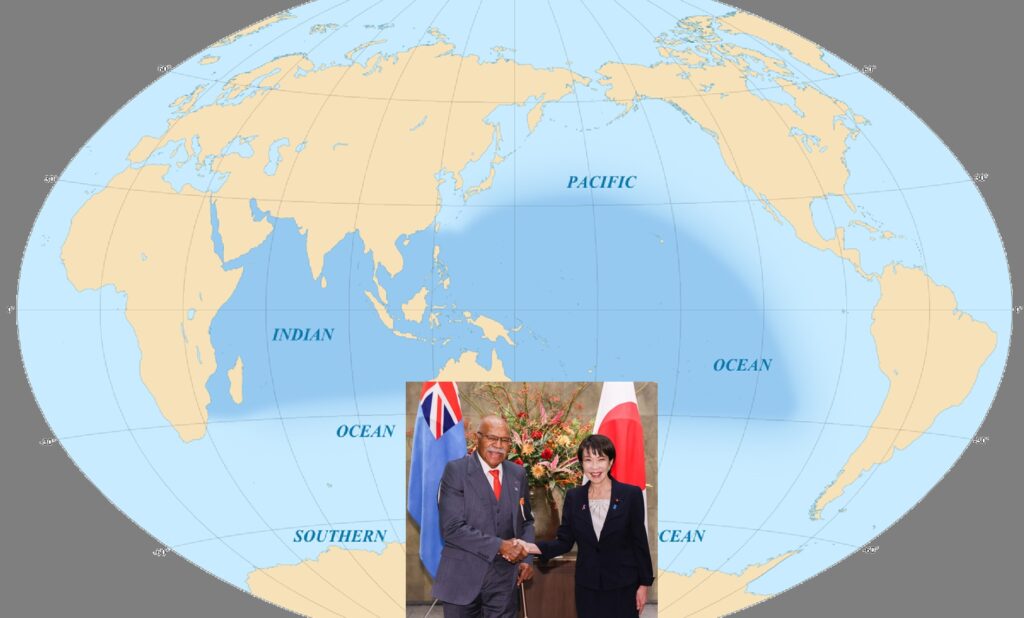
- Japan and Fiji’s bilateral relations are rooted in shared principles, respect for the rule of law and a common vision of a Free and Open Indo-Pacific.
- The partnership between Japan and Fiji will help promote regional unity and will also contribute to security in the Asia-Pacific area.
- The renewed and strengthened Japan-Fiji ties will have positive outcomes for India as they underscore India’s vision of regional unity and are also complementary to India’s Indo-Pacific strategy.
Japan and Fiji recently elevated their bilateral ties into a comprehensive partnership through the new ‘Lomavata Kizuna’ agreement. ‘Lomavata’ means ‘unity’ in the Fijian language, while the term ‘Kizuna’ translates to ‘bond’, therefore signalling the deepening of ties between the two sides. The partnership agreement was signed by Japan’s PM Sanae Takaichi and Fiji’s PM Sitiveni Rabuka following a Summit meeting held in Tokyo on 13 November 2025. The agreement reflects enhanced relations between Japan and Fiji and further expands their framework of cooperation in different sectors. Japanese PM Takaichi said that “partnership between the two nations spans over education, health, medical facilities, infrastructure, sports, disaster prevention, among others”. She further stated that “through the Lomavata Kizuna Partnership, we will continue to strengthen this cooperation”.
The meeting also marked a milestone with regard to collaboration in the defence sector, with Fiji welcoming the world’s first delivery of equipment under the Official Security Assistance (OSA) Programme by Japan. Discussion among the two leaders also focused on maritime and other security concerns, and there was mutual agreement on combating illegal and criminal activities in the Indian Ocean Region. Japan and Fiji’s bilateral relations are therefore rooted in shared principles, respect for the rule of law and a common vision of a Free and Open Indo-Pacific.
Such a partnership between Japan and Fiji will help promote regional unity and will also contribute to security in the Asia-Pacific area. During the Summit meeting, leaders of both nations strongly agreed on the importance of establishing regional stability, especially given the increased instances of militarisation in the Asia-Pacific region. The two leaders called for “proactive, responsible and transparent engagement to uphold regional peace and security”. They emphasised the importance of cooperation and dialogue over disagreements and confrontation.
Japan-Fiji Ties And Their Shared Vision In The Indo-Pacific
Both Japan and Fiji are island nations. While Japan is an important player in East Asia, Fiji is a part of Oceania in the South Pacific. Fiji achieved its independence in 1970 and has been subject to unstable political conditions ranging from military coups to democracy. Its economy is largely dependent on tourism, fishing and agriculture. Japan, on the other hand, is one of the most developed nations of the world economically as well as culturally. With its advanced technology, Japan is also a major regional player. Over the years, it has provided Fiji with assistance in different forms. At the meeting, Fijian PM Sitiveni Rabuka appreciated Japan’s help in providing developmental assistance and its cooperation in several key projects in Fiji. Japan’s investment in capacity building and providing support to the smaller island nations helps in building their resilience to deal with economic and climate-related challenges. This indicates Japan’s commitment to upholding regional unity rather than asserting unilateral dominance. The ‘Lomavata Kizuna’ agreement, therefore, reflects a strengthening of the regional order.
Japan and Fiji are also important players in the Indo-Pacific region and strongly support a rules-based maritime order in line with the UNCLOS. In a joint statement earlier in August 2025, the two sides reaffirmed their commitment to a free, open, inclusive and secure vision of the Indo-Pacific. Fiji’s declaration of ‘Ocean of Peace’ aligns with Japan’s ‘Free and Open Indo-Pacific’ (FOIP) vision. They are both also part of the Pacific Island Forum (PIF), of which the next such meeting is scheduled in 2027, where they can collectively work together on achieving the ‘2050 Strategy’ for the Blue Pacific Continent of the PIF. The recent Japan-Fiji partnership is therefore also significant in the context of the larger Indo-Pacific region.
Furthermore, Japan’s growing association in the Pacific region and its increased support for maritime security will reinforce the Indo-Pacific strategy of most island nations. It is through the continuous collaboration between Asian and Pacific Islands nations that will eventually lead to greater regional connectivity, economic linkages and strengthened security mechanisms. For instance, in the Pacific Island Meetings held last year, leaders from Japan and other Pacific Island nations remained united against any threat to the security in the region and had also expressed concerns over the increasing military influence of China.
Significance for India
The renewed and strengthened Japan-Fiji ties will, in ways, have positive outcomes for India as it underscores India’s vision of regional unity and is also complementary to India’s Indo-Pacific strategy. India shares close relations with Japan as well and has also established strong relations with the island nation of Fiji. India has set up a Defence Attaché in Suva, besides the two sides are also collaborating in maritime and cyber security. Fiji has expressed interest in India’s Indo-Pacific Outlook (IPOI), which aligns closely with the ‘Free and Open Indo-Pacific’ strategy of the island nation. India, through its ‘Neighbourhood First’ Policy and the Act East as well as Act Far East Policy, aims to further strengthen regional connectivity. In this context, India should positively view the renewed Japan-Fiji partnership as it contributes to regional unity. Besides, the onboarding of stronger partners adds weight to the shared vision among nations and is a win-win for all, such as in the context of the Indo-Pacific.
References:
- https://www.fijitimes.com.fj/japan-and-fiji-strengthen-ties-under-new-lomavata-kizuna-partn ership/
- https://www.mofa.go.jp/a_o/ocn/fj/pageite_000001_01371.html
- https://pina.com.fj/2025/11/14/japan-and-fiji-raise-concerns-over-rapid-military-buildup-in-th e-region/
- https://capssindia.org/japans-increased-involvement-with-the-pacific-island-countries/
- https://www.dsalert.org/news/india-and-fiji-a-new-chapter-in-defence-cooperation-and-indo-p acific-security/
Faareha is a PhD scholar awaiting her final defence and has worked on India’s Act East Policy. She is currently a Non-Resident Fellow at the Subhas Chandra Bose Chair on International Relations at Chanakya University. She has previously completed her six-month research internship at India’s Council of World Affairs. Views expressed are the author’s own.
